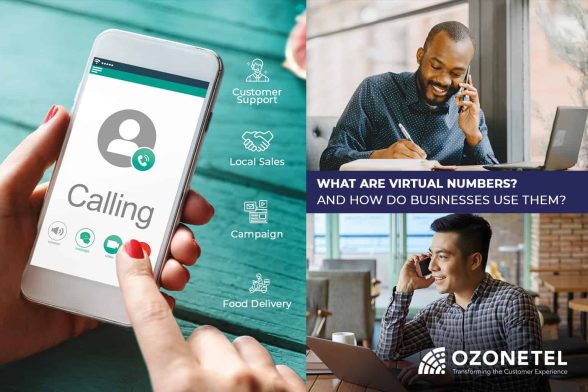- Resources
- What are Virtual numbers? And how do businesses use them?
What are Virtual numbers? And how do businesses use them?

Managing customer communications is vital to any business. You can create strong bonds with your customers by offering around-the-clock service and seamless communication throughout the customer journey. This article explains how virtual numbers can help you do this.
In this article, we will explore:
What are Virtual or DID numbers?
Virtual numbers, also known as Direct Inward Dialing numbers (DID), are telephone numbers without a physical extension linked to them. Although these numbers only exist virtually, calls to these phone numbers can be routed to existing landlines or mobile phones.
For businesses, virtual numbers are customer-facing phone numbers. They purchase a single virtual number or multiple virtual numbers based on how they want to use the number. The main business benefits they are looking for are: streamlining call management; enabling compliance, customer privacy & data security; and tracking calls made between customers and staff.
- A single virtual number can be shared amongst multiple landlines.
- The virtual number masks the phone number of the actual device on which the calls are being answered or made.
Four kinds of virtual numbers are available to businesses:
- Toll-free numbers
- Local Numbers
- Vanity numbers
- Mobile phone numbers
Six ways in which businesses use virtual numbers
Using DID or virtual numbers helps businesses centralize their call management while ensuring a simple, secure, professional experience for your prospects or customers. Here are six ways in which enterprises and start-ups, across various industry verticals, use virtual numbers.
Centralizing their customer support or sales
When it comes to helplines, businesses need to provide customers with a single phone number to contact. Similarly, for advertising campaigns that run online, on print ads, radio ads, or OOH advertisements, they need to provide customers with simple, easy-to-remember phone numbers to call. Sharing a single, easy-to-remember phone number increases the chances of prospective customers dialing them, and is in this way critical to marketing success.
A cloud telephony system can then route calls to this single virtual number to a large call center or team of agents. Now, these agents could be seated in a single premise or located on 2 or
more large premises across the globe, or even working from home, the customer is smoothly routed to the first available agent, giving them a seamless experience. And in case no agent is available to answer calls at a given moment, these calls can be answered by a virtual attendant or IVR.
Establishing a local presence for sales or support.
When managing an outbound sales campaign, you may notice that often prospects refuse to answer calls from an unknown number. By using virtual numbers, you can match the geographic region and improve the call pickup rates. This feature helps you establish a local presence no matter where your call center agents are located.
When you share local numbers with your customers or prospects it makes it easier for them to reach out as well. So for customer support centers too, while you have a centralized call center operation, you can still distribute local support numbers to your customers.
ALSO READ:
Tracking returns on marketing campaigns
Use virtual numbers to track your returns on marketing investment. To begin with, assign a separate virtual number for each campaign. For example, publish a separate number on your OOH advertising, another one on your online ads, and the third number on your print ads. You may route the calls to the same or different set of agents, but either way, the marketing manager can clearly see how many leads have come in per campaign by accessing your call center reports.
Enabling Relationship Management for Banks & Financial Services
Many businesses need to offer customers one-on-one conversations with their employees. For example, banks and insurance companies like to assign relationship managers to their customers. One way to manage these calls is through virtual numbers.
Since the numbers are not assigned to one specific phone, you can ensure that the relationship manager never misses a client call. When they are not at his or her desk, their client calls can automatically be forwarded by the system to their mobile phones. Or these calls could be routed to the agent’s landline at home,
Tracking Field Sales Calls
Field sales representatives such as medical representatives and real estate agents are always on the move. They carry out a large part of their communications via their mobile phones. Virtual phone numbers help businesses track and manage these calls. Businesses assign a virtual number to each of their sales agents so that these agents can these phone numbers rather than their personal phone numbers with customers.
Calls are now easy to record and track. With a simple CTI connector, these calls can be logged into the CRM automatically, making it easy to find call records against customer tickets.
Improving Ecommerce & Food Delivery Experiences
On-the-move service delivery agents sometimes need to contact customers for directions or other instances such as when the customer is not answering their doorbell during a delivery. For all such communications, businesses assign a virtual number to their delivery agents. Their cloud telephony system also assigns a temporary virtual number to the customers. So delivery agents can call customers and speak to them using their mobile phones but the caller id that shows up on both phones is actually a virtual number.
In this way, the customers and delivery agents can speak to each other without revealing their personal phone numbers. And the calls are also recorded and tracked by the system for compliance, quality, and training purposes.
Connecting Service Engineers with Customers
Another business use case for virtual numbers is in the case of appliance companies that need to manage communications between their customers and service engineers. Since these service engineers spend the day making house visits to resolve complaints and fix issues with appliances, they are always on the move.
Yet, these are the experts who need to talk to the customer, understand their problem, and coordinate the completion of a house visit with the requisite tools and equipment needed to fix the problem.
An efficient setup that lets them communicate with the customer is essential.
In these cases, the cloud telephony system temporarily assigns a virtual number to customers who need to speak with service engineers.
The company shares this number with the field engineer (most likely through an SMS text and email) and simultaneously shares the engineers’ virtual phone number with the customer. Now they both can speak to each other and coordinate the house-visit efficiently. And the best part? Neither the service engineer nor the customer’s need to share their actual phone number for these interactions.
Businesses can recycle virtual numbers
In the above use case, where virtual numbers enable communication between service engineers and customers, the virtual number remains assigned to the customer only as long as the customer complaint is unresolved. Once the complaint is resolved, the virtual number is recycled by the company.
Similarly, businesses recycle the virtual numbers used for communications with delivery agents or vendors.
If you are a business that uses virtual numbers, talk to our solution experts about how you can recycle your virtual numbers to reduce your operating costs.
Some examples of using virtual numbers this way include:
- Pharma companies give their medical representatives, who are always on-the-move, virtual numbers which they use to communicate with doctors, and fix appointments.
- Real estate companies give their field sales staff virtual numbers to share with clients for coordinating their field visits and follow-up calls.
Conclusion
Using virtual or DID numbers, you can manage operations from a centralized call center or via remote employees. This helps customers associate a single number with your brand. It enables your staff to manage their business and personal calls on the same phone number while ensuring that you can track and record these conversations. And finally, it gives your business greater control over your customer communications while improving the customer experience.
Virtual phone number solutions for your business
When it comes to virtual number solutions, we’re the experts.
Ozonetel offers virtual phone numbers in 160+ countries across the globe. In India, this includes 18 geographies across all telecom circles within the country. Learn more about how our virtual phone number combined with our dependable cloud telephony, call routing, and call forwarding capabilities can help your business manage its communications in customer-centric and innovative ways.
Talk to sales to get a demo today for virtual number solutions in India, UAE, or United States.







